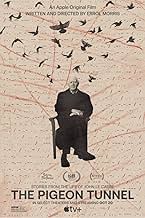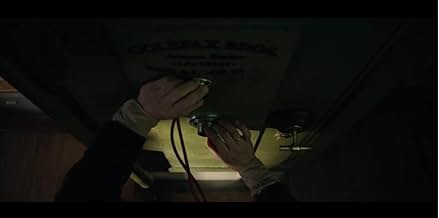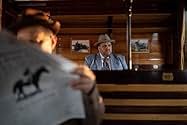IMDb रेटिंग
7.0/10
2.1 हज़ार
आपकी रेटिंग
अकादमी पुरस्कार विजेता एरोल मॉरिस ने साहित्यिक जगत में जॉन ले कैरे नामक विख्यात पूर्व जासूस, डेविड कॉर्नवेल के ऐतिहासिक जीवन और करियर से पर्दा हटाया।अकादमी पुरस्कार विजेता एरोल मॉरिस ने साहित्यिक जगत में जॉन ले कैरे नामक विख्यात पूर्व जासूस, डेविड कॉर्नवेल के ऐतिहासिक जीवन और करियर से पर्दा हटाया।अकादमी पुरस्कार विजेता एरोल मॉरिस ने साहित्यिक जगत में जॉन ले कैरे नामक विख्यात पूर्व जासूस, डेविड कॉर्नवेल के ऐतिहासिक जीवन और करियर से पर्दा हटाया।
- पुरस्कार
- 3 जीत और कुल 10 नामांकन
Zoltán Nagyhegyesi
- Nick Elliott
- (as Zoltan Nagy Hegyesi)
फ़ीचर्ड समीक्षाएं
Director Errol Morris has made some pretty great documentaries in his career like "The Thin Blue Line, A Brief History of Time, and Fog of War" as Morris provides some interesting insightful documentaries and stories. With this one focusing on the career and life of John le Carré, Morris takes an interesting look of Carré's personality, career and the outlooks of the Cold War era and for the most part, it was solid.
John le Carré being the main subject provides some good and interesting conversations and discussions about his ideas and career with some pretty interesting dramatic reenactment moments to demonstrate the setting and environment. Throughout, the production was solid with the camerawork being good although nothing too special about it's presentation and colors. The conversations between Morris and Carré are strong as if there was good chemistry between the two of them.
However, the engagement wasn't the strongest as since topics about spy career isn't my most favorite genre of literature, there were some pacing moments that did feel a little sloppy that made certain subjects feel uninteresting to discuss about. There were certain discussion moments that I wished they had focused a little on more. The soundtrack does end up getting obnoxious as the soundtrack distracts certain moments.
Overall, it's an interesting documentary but it's not my favorite from Morris.
John le Carré being the main subject provides some good and interesting conversations and discussions about his ideas and career with some pretty interesting dramatic reenactment moments to demonstrate the setting and environment. Throughout, the production was solid with the camerawork being good although nothing too special about it's presentation and colors. The conversations between Morris and Carré are strong as if there was good chemistry between the two of them.
However, the engagement wasn't the strongest as since topics about spy career isn't my most favorite genre of literature, there were some pacing moments that did feel a little sloppy that made certain subjects feel uninteresting to discuss about. There were certain discussion moments that I wished they had focused a little on more. The soundtrack does end up getting obnoxious as the soundtrack distracts certain moments.
Overall, it's an interesting documentary but it's not my favorite from Morris.
Getting inside the head of a spy is undoubtedly challenging; getting inside the head of a novelist who was once a spy who now writes about that enigmatic profession is nearly impossible. And that's one of the hurdles that hampers this profile of former MI5 and MI6 operative David Cornwell, better known to the world by his pen name, John le Carré (1931-2020). Based on the author's memoir of the same name, the latest from documentarian Errol Morris puts the best-selling espionage novelist under the microscope, seeking to discover who le Carré is, what factors impacted his life and writings, and how his novels mirror those influences in terms of content and themes. Through discussions of books like "The Spy Who Came in from the Cold," "Tinker, Tailor, Soldier, Spy," "Smiley's People," "A Perfect Spy" and "The Looking Glass War," backed by clips of film and television adaptations of these works, le Carré and Morris ruminate on the writer's objectives in bringing them to life, some of them personal in nature and some of them expressions of his feelings about the murky underworld he left behind and brought to life on the printed page. Much of what the author consequently discusses comes across as dark, cryptic, and characterized by rampant intrigue and betrayal, not unlike the life he left behind (as well as the dismal upbringing he underwent at the knee of his untrustworthy father, a professional swindler adept at plying his craft). The insights, to say the least, are rather depressing and disquieting. But that unsettling material is further compounded by a string of often-perplexing observations about le Carré's existential outlooks and literary intentions, some of which seemingly amount to little more than oh so much navel gazing and intellectual masturbation, overstated attempts at encapsulating his perspectives on human nature and human relations as reflected through his works. I can imagine that there's probably a market for a film like this among Anglophiles captivated by the writer's works, the spy novel genre in general and PBS/BBC television dramas, but it really didn't do much for me, especially since this offering pales in comparison to many of Morris's other better productions. Thankfully, the picture's merciful 1:32:00 runtime proved to be its saving grace (even though the picture admittedly improves once it gets past an overly long, excessively detailed prologue). Ironically, le Carré notes in the film that he sees his novels as an antidote to the James Bond books and movies, but, from where I stand, I'll take 007 over this any day.
Fascinating, insightful, and informative. I could say more, but the "actor" says it better. However ... talking heads (with the occasional interjection from the writer/director Errol Morris in this case) often use other author's words, and this can leave the viewer feeling as if the question asked has not been answered, and sometimes avoided. Here, whilst the subject replies honestly, he also admits to a possible distortion by the hand of time, youth, and literary escapology and invention. I thoroughly enjoyed his affable demeanour, his candour and the insight it gave into the parallels between the books and his life. Any and every fan of John Le Carre's work should watch this tv film/documentary.
The Pigeon Tunnel isn't just an interview with spy novelist John LeCarre, but a fascinating and deeply rewarding introspection. LeCarre is engaging, open and honest about his childhood and his deeply flawed relationship with his parents. A former British spy - although he contends not a very good one - he would use those experiences to pen some of the best spy novels ever, including my favorite "Tinker, Tailor, Soldier, Soy." LeCarre visits and revisits betrayal as the central source of his writing, which he claims as art, a thought that many critics might not agree with. In the end, LeCarre imagined a world both bludgeoned with honesty and filled with a desire for fantasy to stunning effect. The Pigeon Tunnel exposes the spy and the man within, leaving us to wonder who he really was. At the end of the film, LeCarre admits "If I'm not writing, I'm an actor without a part," perhaps giving us some amount of insight into this complex and engaging man.
Based in part on Le Carre's book, this is a fascinating insight into the mind and works of Le Carre / David Cornwell. The documentary mixes interviews with Cornwell in a darkened library with dramatised clips, as he recalls his childhood especially his extraordinarily disreputable father who despite being a complete fraud seems to have influenced Cornwell considerably. He then goes on to explain his role in the secret service and the seemingly deranged minds of those around him, including Kim Philby who seem to thrive on deceipt. Thereafter he has used this knowledge, his fertile imagination and his childhood experiences to craft so many great spy novels.
It is all thoroughly absorbing helped immeasurably by the man himself whose warm treacly erudition cannot fail to keep you entertained. It is interesting that this smooth manner must have helped a lot when he was interrogating and you therefore wonder when being 'interrogated' himself by filmmaker Errol Morris whether everything he claims is true, actually is - he is after all an expert on deception.
The Pigeon Tunnel title is explained at the beginning of the film and goes some way to explaining why most of his books start off being called The Pigeon Tunnel.
It is all thoroughly absorbing helped immeasurably by the man himself whose warm treacly erudition cannot fail to keep you entertained. It is interesting that this smooth manner must have helped a lot when he was interrogating and you therefore wonder when being 'interrogated' himself by filmmaker Errol Morris whether everything he claims is true, actually is - he is after all an expert on deception.
The Pigeon Tunnel title is explained at the beginning of the film and goes some way to explaining why most of his books start off being called The Pigeon Tunnel.
क्या आपको पता है
- भाव
David Cornwell: I wasn't a dupe; I was invited to dupe other people.
- कनेक्शनReferenced in Film Junk Podcast: Episode 917: Priscilla (2023)
टॉप पसंद
रेटिंग देने के लिए साइन-इन करें और वैयक्तिकृत सुझावों के लिए वॉचलिस्ट करें
- How long is The Pigeon Tunnel?Alexa द्वारा संचालित
विवरण
बॉक्स ऑफ़िस
- दुनिया भर में सकल
- $44,996
- चलने की अवधि
- 1 घं 32 मि(92 min)
- रंग
इस पेज में योगदान दें
किसी बदलाव का सुझाव दें या अनुपलब्ध कॉन्टेंट जोड़ें




























